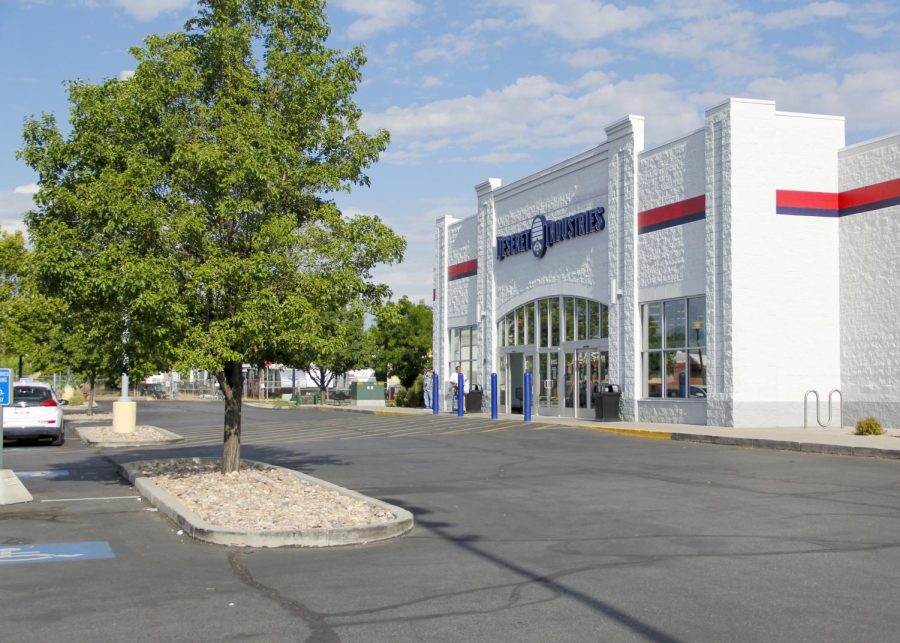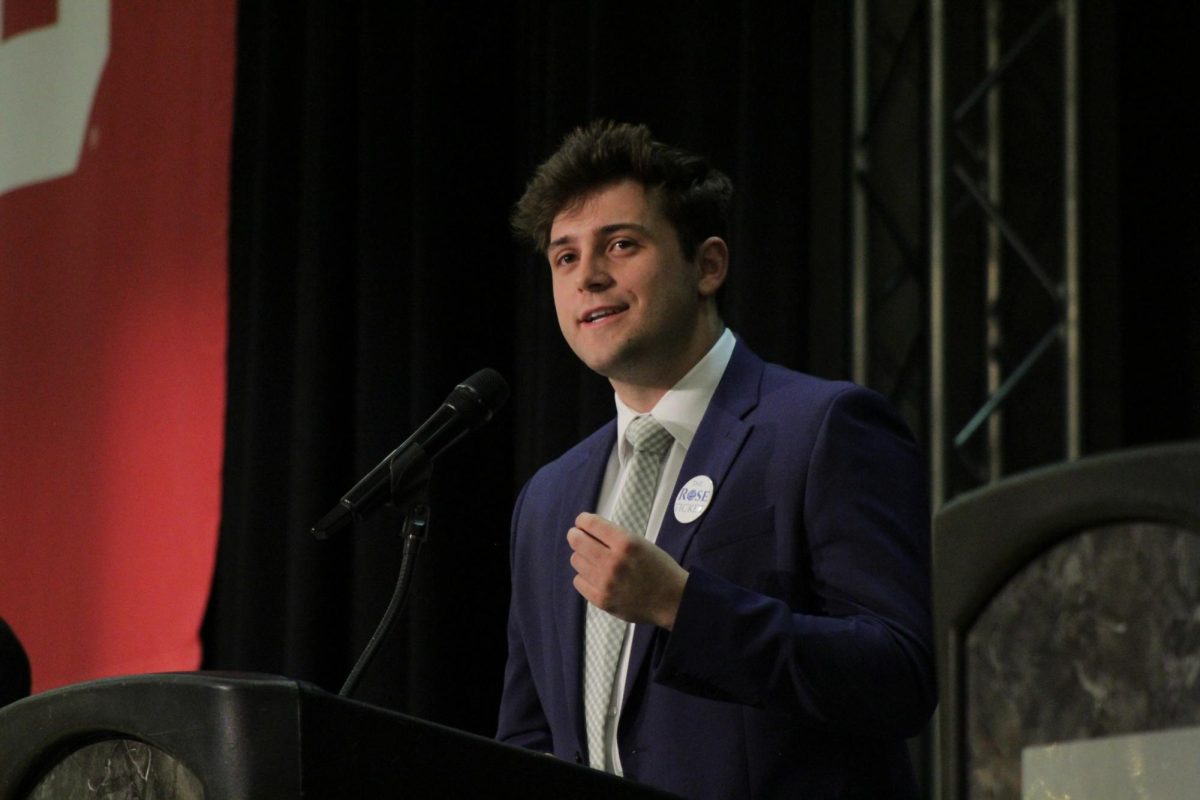Lien: Heatwaves Kill
Deseret Industries Thrift Store & Donation Center in Murray, Salt Lake City, Utah on Monday, Aug. 5, 2022. (Photo by Amen Koutowogbe | The Daily Utah Chronicle)
August 20, 2022
People have started dying in the United States. due to the current heatwave moving through the Pacific Northwest. Heat is reportedly the most deadly extreme weather event, and large parts of the country will stay at high temperatures throughout the warmer months.
As the climate heats up, the likelihood of heat waves occurring increases. And an abundance of heat influences water usage, finances, gas usage and electricity. This heatwave adversely affects individuals as well as the economy.
Despite Utah being a desert state, we weren’t prepared for the insane temperature highs we saw this past month and we won’t be moving forward.
Human Impact
Low-income areas are hit by heatwaves hardest, due to inaccessibility of air conditioning — in the U.S., Native American and Black communities have the highest rates of heat-related deaths.
Heatwaves can result in more hospital visits, loss of efficiency in construction and agriculture, less agricultural yield and damage to infrastructure. People lose their capacity to work and productivity slows down as temperatures increase.
Last year, around 800 people died during a heatwave in Oregon and Washington. This trend also appears across Europe and Asia, with over 2,000 people having died from heat-related causes in Spain and Portugal.
Heat-related illnesses also hurt people in the long-term. If an individual doesn’t die initially, it’ll affect them for years. Heat stroke causes loss of memory, damage to vital organs such as the brain, heart, liver and kidneys, and adversely affects cognitive function.
Economic Impact
Economies have been found to grow at slower paces during hot summers. The combined power of heatwaves and consistent droughts is a major threat to agriculture, which plays a large part in Utah’s economy. The heat has been found to cause 10 times more damage to crops than is currently projected. The damage will only increase with time.
Small businesses like the relatively young restaurant Ramen Haus feel this change acutely. “It’s pretty typical in the summer time for us to slow down like a little bit, just because it’s ramen and ramen is hard in the summer,” said Chloe Young, a Ramen Haus employee. “But I’ve noticed [this] with … the higher heats for sure. We have like 700-dollar days and as a business … what if we don’t make like 2000 dollars a day? We could fall short on rent.”
With the heat slowing customer turnout, Young said they have to cut staff. “So we have to go into … bare bones mode where it’s only one cook, maybe a dishwasher, and then just the two servers every night,” she said. This sort of operation isn’t sustainable for those with bills to pay.
Energy grids struggle to keep up with the demand for air conditioning, and many are expecting rolling blackouts throughout the summer months. Companies’ bottom lines will be affected as they lose revenue to cool down offices and keep workplaces safe from heat-related illnesses. Stock prices on average also drop about 22 basis points during a heat spell.
Aside from less revenue for businesses, the heatwave also hurts vital services we need as a community. Utah firefighters face the brunt of the work, quelling wildfires that spring from the heat. While doing their jobs, firefighters are also at risk of developing heat-related illnesses due to the extreme weather and exertion involved in wearing the necessary protective gear.
I am tired of beating the dead horse that is climate change. The effects are tangible and fatal and yet entirely dismissible by those who have the privilege of ignoring it. Average individuals themselves are forced to evaluate their carbon footprint, while the rich and famous get off scot-free. People like Kylie Jenner pump carbon into the atmosphere while we’re left to pay extra for sustainability. I am lucky to have the ability to cringe at my air conditioning bill — others are dying in their overheated homes.
Heat kills people and businesses at the same time. We need to get climate change under control because human lives are paying the price for inaction. At some point, the loss of money will cause those in power to take notice. For now, we will mourn the dead and turn on our fans.














John Hedberg • Aug 21, 2022 at 6:10 pm
According to the CDC, from 1999 – 2015, “exposure to natural cold” killed more than 2.4 times as many people as “exposure to natural heat” in the US. That means that cold is by far the larger threat to all people, disadvantaged and otherwise. Also, fossil fuels are the basis of cheap energy and agricultural fertilizers, so when fossil fuels become expensive (i.e. scarce, due to decreased production), the price of energy goes up, the price of food goes up, and people lack both the calories and the energy needed to stay alive, particularly poor folks, and especially children and old people.
Sri Lanka recently tried converting from fossil-based fertilizers to “organic” sources, and their economy crashed, inducing nationwide hunger and malnutrition: the government was overthrown by a coup, and the leadership fled the country due to blatant incompetence (they tried an experiment based on ideology rather than science, and they had no contingencies if they were wrong, meaning they were willing to roll the dice, and if the people starved, that was fine with the leaders, as long as they could look good at climate conferences).
Here in the US, the push to reduce fossil fuel production, both by limiting leases on federal lands, and by constricting options to finance exploration, have caused a spike in energy prices which, again, have hit the poorest and most disadvantaged people the hardest, who now can’t afford energy for their homes and transportation to work, even as grocery prices rise at record paces. Where’s your outrage for disadvantaged people now?
It’s all good to talk about net zero emissions, but when eliminating fossil fuels from agriculture and economies threatens to induce worldwide hunger and economic implosion, which hits disadvantaged people hardest to the point of famine and death, you’d better make sure there’s justification for the suffering you’re deliberately bringing down on the heads of innocent millions.
Again, the Obama’s aren’t investing in beach property on the Kenai Peninsula, so rising temperatures appear to be gradual, or the brightest people in the world wouldn’t be paying top dollar for beachfront property all across Cape Cod.
Cheers, with Love~
J Hedberg
John Hedberg • Aug 20, 2022 at 12:41 pm
(Re-Tweet)
Here’s my question: is global warming really an emergency?
There are ancient cities near Istanbul that have been found totally ocean-submerged, where people obviously used to live. Since the end of the last major ice age, temperatures have gradually tended higher, along with sea levels. Even without much science or techno-savvy, people and species adapted just fine.
The Obama’s (smart people, obviously) just bought a waterside estate on Martha’s Vineyard, so they don’t believe in any imminent climate peril. I see serious peril when it comes to species and habitat loss through thoughtless development, and I’m worried about all the trash in the oceans. Global warming doesn’t really seem too imminent as a peril, not when most of the planet’s arable landmass is presently sub-arctic, and we gain 3 acres of new land up North for every acre we lose on the equator. People can grab a bus, and we can bring along all the flora & fauna as we settle all the Green New Places up North.
That said, I’m for renewable carbon-free energy at a pace that won’t bring famine, economic collapse, and war (these always seem to go together: have you ever noticed?). It seems perfectly reasonable to rely on natural gas more as we transition away from coal and oil, and toward nuclear, wind, solar, tidal, and geothermal sources. We haven’t even figured out how to store the intermittent energy from wind & solar yet, especially since battery manufacture & disposal produce a bigger ecological footprint than the batteries save, so STEM majors still have a lot of work ahead. In the mean time, we can plant more trees, preserve wilderness from thoughtless development, and start moving people and resources North into the new habitable zones. It doesn’t have to happen overnight, so slowly greening up the North as we migrate and transition from carbon seems like it should solve the problem.
Meanwhile, the speed of global warming doesn’t seem so threatening that the Obama’s are buying beach property on Hudson Bay. When Sasha and Malia start buying property in Greenland, maybe then it’ll be time to call it an emergency.
Just a point of view. 70 years ago, scientists thought the Earth was going into a period of global cooling (the data at the time supported this). Take everything one step at a time.
Cheers~
Best,
J Hedberg
Daniel Geery • Aug 21, 2022 at 1:56 pm
Thousands of books have been written on this topic, and I hardly wish to add to the list here. But this interview BY Bernie Sanders of Guy McPherson may be of interest if it is allowed to be published here: https://youtu.be/4fhzUWewJDY
John Hedberg • Aug 22, 2022 at 12:06 pm
Daniel,
Considering the interview is an hour and 12 minutes long, and we’re just starting a new semester, would you mind including a synopsis?
Best,
J Hedberg